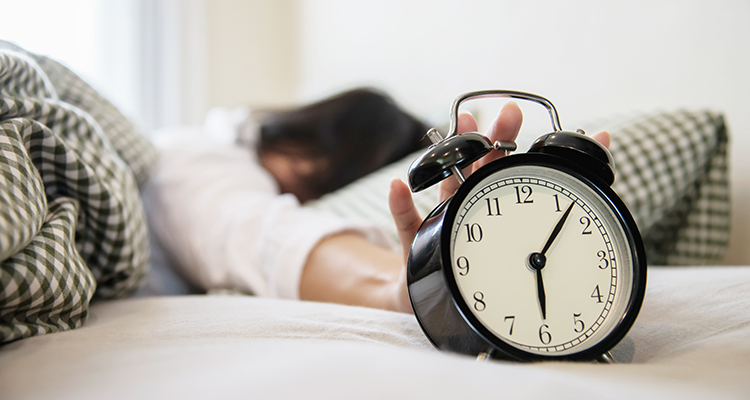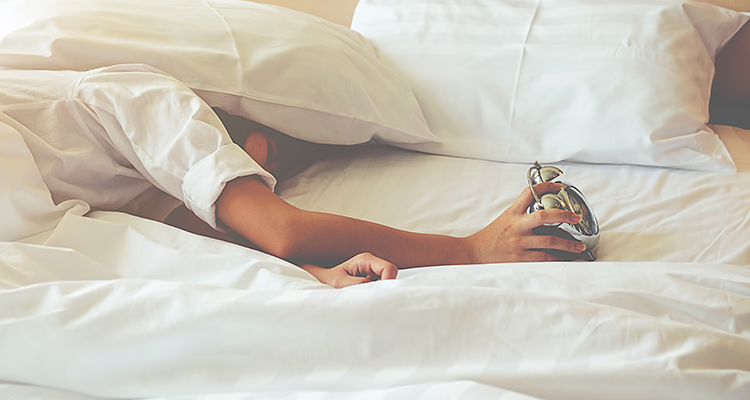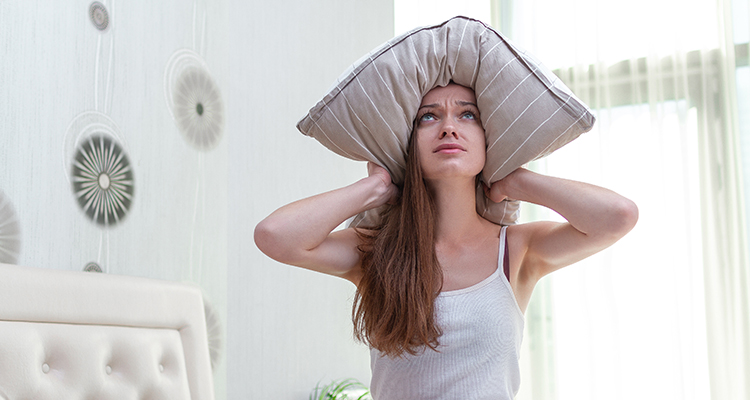Overcoming Sleep Maintenance Insomnia and Staying Asleep for Good
A quarter of people report waking up at least once a night. A number of factors can interrupt your sleep from nightmares and noise to sudden changes in your environment or a restless partner or child.

Most people can settle back into bed and fall back asleep within minutes, while others toss, turn, and struggle for 30 minutes or longer. If the latter describes you, you may be suffering from maintenance insomnia.
Here we’ll take a closer look at this sleep condition including causes and ways to combat it. After reading this article you’ll have a much better understanding of what’s keeping you up at night and ways to improve your sleep quality.
Content
What is Maintenance Insomnia?
Sleep maintenance insomnia is the inability to stay asleep throughout the night. It’s often associated with waking up multiple times during the night and taking longer than 20 minutes to fall back asleep. If you find yourself waking up more than three times a week for longer than three months, you may be battling maintenance insomnia.

In some cases, sufferers wake shortly after falling asleep while others wake in the early morning hours and are forced to stay awake.
This fragmented sleep can cause a long list of unpleasant side effects including irritability, daytime fatigue, confusion, and headaches just to name a few. The more you stress over the inability to stay asleep, the harder it is to achieve a quality night’s rest, creating a vicious and destructive cycle.
Let’s take a closer look at what causes maintenance insomnia and what you can do to help.
Causes of Maintenance Insomnia
There’s no known cause for sleep maintenance insomnia (SMI) but instead, external factors that might interfere with your ability to stay asleep.

One doctor, however, credits historical evidence as an explanation for why we naturally wake up during the night. In the 17th century, historian Roger Ekirch explained that people sleep in two bouts and experience a period of wakefulness in the middle of the night. Before electricity, people would fall asleep after sunset and stay asleep until sunrise. This meant they were sleeping for between 12 and 15 hours a night! That’s nearly 6 hours longer than the 7 to 9 hours recommended for adults. Because of this, there’s a disconnect between darkness and how much sleep people need.
With the invention of electricity, people naturally extended their wake hours much later into the night and consolidated sleep into one long stretch (or bout). Unfortunately, some people still struggle to sleep for one, long period of time. During this time, a number of factors (both physical and mental) can cause you to wake up and make it impossible to fall back to sleep.
Natural Sleep Cycles
As you progress through the different stages of sleep, you’re more likely to wake during some than others. Your natural sleep cycle consists of four stages including 3 NREM cycles and one REM cycle.
NREM stands for “non-REM” sleep and most people experience 3 of these cycles per night, ranging in duration from 5 minutes up to 60 minutes. The higher the stage of NREM sleep you’re in, the harder it is to wake up.
Stage 1 generally lasts for between 1 and 5 minutes and is described as the time it takes you to “doze off”. During this stage, your body is just starting to relax and brain activity is slowing down. Because you’re not fully asleep, it’s quite easy to wake during the stage 1 NREM cycle. Without disruption, most people move quickly from stage 1 to stage 2.
Stage 2 of NREM sleep lasts between 10 and 30 minutes and happens as your body enters a more subdued state. Your muscles begin to relax, your heart and breathing rates slow down, and your body temperature lowers. Short bursts of brain activity make you less susceptible to being woken by external factors during this stage in the sleep cycle.
Stage 3 sleep is also referred to as deep sleep. As the name suggests, it’s more difficult to wake someone once they enter this stage of the sleep cycle. During stage 3, your muscles relax even more and your breathing and heart rate slow. It’s during this stage that your body experiences recovery and growth. For many people, the first half of the night is spent in the deep sleep stage.
REM sleep is the last stage of the sleep cycle and the one most people are familiar with. The REM (or rapid eye movement) stage of sleep is when your brain is most active. This is when most people experience vivid dreams and strengthen both memory and creativity.
While your brain activity is heightened at this stage, your muscles are in a state of paralysis, with two significant exceptions — the muscles that control breathing and your eyes (hence the name).
Most people enter the REM stage of sleep after 90 minutes and remain there for most of the second half of the night. Because of the lack of muscle movement during this stage of sleep, it’s often difficult to wake or disturb someone during REM sleep.
Each of the 4 sleep stages are what makes up your natural sleep cycle. On average, you’ll go through this cycle up to six times per night. It’s in the earlier stages of sleep when you’re not yet fully relaxed, that maintenance insomnia strikes.
Stress
Stress is one of the leading causes of all types of insomnia — maintenance insomnia included. When you’re stressed, your body experiences the “flight or fight” response. Your heart rate and breathing increase and you may experience alertness and racing thoughts. All of which make it impossible to fall asleep.

Frequently waking up and worrying over the inability to fall back to sleep can increase your stress levels, creating a vicious cycle of waking and struggling to go back to sleep.
Pain
Whether you suffer from chronic or acute pain caused by a recent injury or accident, discomfort is another potential cause of maintenance insomnia.
When you’re in pain, it’s difficult to find a comfortable sleep position. Even if you do get comfy and finally fall asleep, it’s likely that your pain will return, waking you up. This can go on multiple times during the night.
Back pain is the most common cause of maintenance insomnia, with over 65 million sufferers. To make matters worse, disrupted sleep can actually aggravate back pain. Lack of restorative sleep compromises your body’s immune system and can even affect cognitive function.
Partners or Children
People who live and sleep alone often have minimal distractions when it comes time for bed. Unfortunately, the same can’t be said for individuals with roommates, spouses, and children.

Loud roommates or neighbors can also create excess noise and disturbances that cause maintenance insomnia.
Nightmares
Speaking of children — they’re not the only ones who have nightmares that wake them from a deep sleep. Nearly half of all adults have nightmares occasionally, with 8% being plagued by chronic nightmares.
So what causes these vivid, sometimes alarming dreams? Nightmares can be triggered by any number of things including stress or sudden traumatic events like divorce or the death of a loved one.
Nightmares cause maintenance insomnia by not only waking you up suddenly and sometimes violently, but making it difficult to fall back asleep. Often, the thoughts and images from your nightmare return every time you close your eyes, making it difficult to relax and settle into a restful sleep.
Noise and Other Outside Disturbances
A number of external factors can also cause maintenance insomnia including noise, light, and changes in your environment.

Sudden changes in temperature can also cause maintenance insomnia. The heat or air conditioning in your home breaking, falling asleep with too many blankets or clothes on, or running a fever can all cause fluctuations in temperature, waking you suddenly and making it difficult to fall back asleep.
Eating or Drinking Before Bed
What you do before bed can significantly impact how well you sleep throughout the night. Eating too close to bedtime or consuming foods high in sugar and saturated fat can create digestion issues and stomach pain.
Rich or heavy foods can also cause heartburn and indigestion. All of these physical ailments can cause you to wake during the night in an effort to alleviate your discomfort.
Consuming alcohol or beverages containing caffeine too close to bed make it difficult for your body to enter deep, restorative sleep. Caffeine is a natural energy booster and while alcohol might relax you enough to fall asleep, once these effects wear off, most people wake at least once during the night.
Medical Conditions or Medication
In addition to pain, other medical conditions like asthma, an overactive thyroid, sleep apnea, and diabetes can cause you to wake frequently during the night.
Some medications can also cause maintenance insomnia including steroids, decongestants, antidepressants, beta agonists, and amphetamines.
Be careful that the medication you’re taking to treat a medical issue that might be causing maintenance insomnia could itself cause sleep disturbances.
Maintenance Insomnia Signs and Symptoms
Waking up during the night is fairly common, so how can you tell if your restless sleep is an isolated incident or if you’re suffering from maintenance insomnia?

Aside from the frequency, here are a few more signs and symptoms that indicate you might be dealing with a chronic condition.
Only Sleeping for a Few Hours At a Time
The main sign of maintenance insomnia is sleeping for only short periods of time. If you find yourself falling asleep only to wake 2 to 3 hours later and then spending another 30 minutes trying to fall back asleep, you may be battling this common sleep disorder.
One restless night of sleep doesn’t qualify as maintenance insomnia. You should seek intervention if you wake several times a night for several days in a row over a 3 month period.
Feeling Stuck Between Being Asleep and Awake
Many people suffering from maintenance insomnia feel trapped between a state of being asleep and being awake.
Do you consider yourself a “light sleeper”? While there’s no scientific evidence that some people are light sleepers where others sleep more deeply, if you’re stuck between a state of complete relaxation (sleeping) and alertness (being awake), it may be a side effect of maintenance insomnia.
Fluttering eyelids, muscle twitching, and being easily roused are all signs that you’re not entering a deep sleep and are still half awake.
Waking Suddenly
Suddenly waking from a state of deep sleep and being unable to fall back asleep is another sign of maintenance insomnia.

Being jerked awake due to a bad dream, loud noise, or another unknown reason is common among those with maintenance insomnia. While there may be a source for your sudden arousal, sometimes, it’s unexplained.
Not only are those with maintenance insomnia subject to suddenly waking up, but finding it impossible to fall back asleep, no matter how hard they try.
Waking Briefly But Frequently
While most people with maintenance insomnia find it difficult to fall back asleep, some wake frequently throughout the night but only for short periods of time.
Do you find yourself waking often, staring at the clock with blurry eyes, and then rolling over to fall back asleep? For these types of insomnia patients, falling back to sleep isn’t the primary issue. Instead, the inability to stay asleep is what plagues them.
Waking Too Early
There’s no worse feeling than waking up at 3:00 a.m. when your alarm is set for 5:30 a.m. and not being able to fall back asleep. Many maintenance insomnia sufferers wake too early in the morning and are unable to fall back asleep.
This happens despite your body’s natural circadian rhythm which controls your sleep-wake cycles. An interruption in your sleep cycle can cause you to wake prematurely and make it difficult to return to a restorative state of sleep.
Side Effects of Maintenance Insomnia
Several months of interrupted sleep are bound to take a toll on your physical and mental wellbeing. Here are some of the most common side effects of maintenance insomnia that you may notice over time.

- Irritability and mood swings
- Inability to focus or concentrate
- Daytime fatigue
- Memory impairment
- Increased stress and anxiety
- Increased risk of making errors
- Not feeling rested
- Compromised immune system
Maintenance insomnia affects everyone differently. You may experience all or some of these side effects based on the root cause of your condition.
Treating Maintenance Insomnia
Maintenance insomnia isn’t always consistent, which can make diagnosing and treating it difficult. If you’re experiencing any of the above signs, symptoms, or side effects, it may be time to take action.

Here are some do’s and don’ts for handling maintenance insomnia.
Do’s
Stick to a Schedule
Sleep schedules are important for everyone but are especially crucial for treating all forms of insomnia.
Your body functions best when it follows a consistent routine and schedule. Doing so helps keep your circadian rhythm in-check. Promote healthy sleep cycles by going to bed and waking around the same time each night — even on weekends.
Avoid naps that might interfere with your schedule.
Read Before Bed
Studies show that reading before bed can help induce sleep. Ditch the Kindle (more on why screens are bad for your sleep patterns in a minute), and crack open your favorite hard covered book.
The type of book you choose can make a big difference. Avoid anything overly engrossing or exciting. Opt for a gossip magazine, book you’ve read multiple times before, or something lighthearted. The last thing you want to do is get hooked on a good story that keeps you from falling asleep.
You can read before bed or use this technique to help you fall back asleep after waking. Just be mindful not to turn on any bright lights that might wake you even further.
Create White Noise
While some noises can jerk you awake at night (the heater kicking on, a car horn, or thunderstorm), white noise can help drown out these sounds, preventing you from waking.
By amplifying background noise using sound machines, soft music, or a fan, you can actually block out other distractions.
Don’ts
Stay in Bed
When you wake frequently throughout the night, it’s tempting to stay in bed, slam your eyes shut and try to force yourself back to sleep. While this might sound like a good idea in theory, anyone with maintenance insomnia will tell you this doesn’t work.
Instead of staying in bed tossing and turning, get up for a few minutes. Take an easy walk around your home, read, or practice your favorite mindfulness exercise. A calming activity can help better prepare your mind and body for sleep. Once you feel tired, return to bed.

Stare at the Clock
Another common habit of insomnia sufferers is staring at the clock. Not only is this torture, but mulling over how long you’ve slept, how long until your alarm goes off, or how long since you last looked at the clock can all keep you awake for hours.
The more consumed you become with watching the clock, the harder it’ll be to fall back to sleep.
Turn on Your Devices
You’ve probably heard it before but it bears repeating — using digital devices before bed can interfere with your body’s natural sleep patterns. The blue light from your phone, television, and computer screen prevent your brain from releasing chemicals like melatonin and serotonin which trigger sleep.
Avoid the urge to roll over and scroll through your phone or social media feed. Don’t turn on the TV to watch your favorite sitcom or flick on your computer to send a few emails. Keep your room dark, peaceful, and quiet.
Overcome Maintenance Insomnia Today
Are you tired of being tired? Are you ready to finally embrace a solid night’s sleep, free from waking frequently and suddenly?

Somnus Therapy can help. With proven sleep restoration techniques including CBT for insomnia, guided sleep meditations, stimulus control therapy, and mindfulness, you can finally achieve the deep, restorative sleep you’ve been dreaming of (literally).
Click here and start your journey toward achieving the blissful sleep you deserve.














